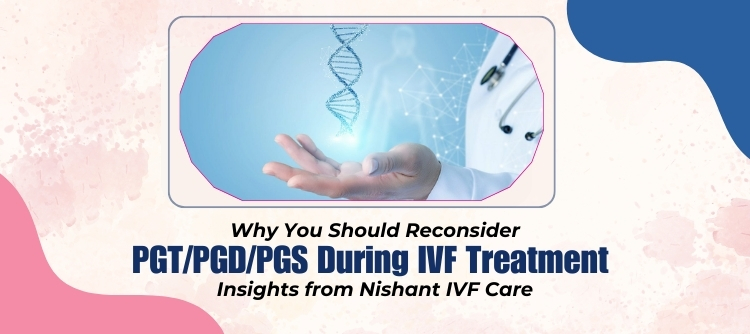Why You Should Reconsider PGT/PGD/PGS During Your IVF Treatment

In the world of assisted reproductive technology, IVF (In Vitro Fertilization) has been a beacon of hope for many aspiring parents. As technology advances, so do the options available to enhance the chances of successful conception and a healthy pregnancy. Preimplantation Genetic Testing (PGT), Preimplantation Genetic Diagnosis (PGD), and Preimplantation Genetic Screening (PGS) are among these advanced options. However, at Nishant IVF Care, we believe it is crucial to approach these technologies with caution. Here’s why you might want to reconsider allowing your doctor to conduct PGT/PGD/PGS during your IVF treatment.
1. Genes Are Not the Same as Chromosomes
Even if an embryo is chromosomally normal, it can still miscarry due to genetic defects that are incompatible with life, which PGT cannot screen for. Patients who experience miscarriages after the transfer of a PGT-normal embryo are often devastated because they were led to believe that the miscarriage rate would be zero. This misconception is a false negative result, highlighting the limitations of PGT in guaranteeing a successful pregnancy.
2. The Phenomenon of Mosaicism
Mosaicism means that not all cells of the embryo are genetically identical. The 2-3 cells biopsied may not represent the remaining 100 cells of the embryo. If the biopsied cells are abnormal, the embryo is discarded, even though the remaining cells might be normal. This can lead to the heartbreaking realization that a potentially healthy embryo was discarded based on a misleading test result, known as a false positive result.
3. Embryo Self-Correction
Embryos are dynamic entities capable of self-correction. Even if a few cells are abnormal, the remaining normal cells can multiply and result in a healthy baby. This potential for self-correction means that discarding an embryo based on abnormal cells could result in the loss of a viable pregnancy, another instance of a false positive result.
4. Technical Limitations of the Test
Patients often underestimate the technical complexity of PGS testing. Many IVF clinics send biopsied cells to genetic labs for testing, which can yield ambiguous and confusing results. IVF doctors, not always well-versed in genetics, may err on the side of caution and discard embryos not reported as completely normal. Additionally, errors in processing the DNA of biopsied cells can result in inconclusive results, further confusing patients and doctors. The skill level of the embryologist performing the biopsy also plays a crucial role; a poorly executed biopsy can damage or kill embryos, a fact often not disclosed to patients.
5. The Need for Prenatal Diagnosis (PND)
Regardless of a normal PGT result, patients will still need prenatal diagnostic testing (PND) when they get pregnant, such as chorionic villus sampling (CVS) at 8 weeks. PND is more reliable and can prevent having a baby with a chromosomal defect. If PND is necessary regardless, spending money on PGT might not be justified.
6. Emotional and Psychological Impact
The IVF journey is already fraught with emotional highs and lows. Introducing genetic testing can add another layer of stress and anxiety. The pressure to achieve a “genetically perfect” embryo can overshadow the primary goal of achieving a healthy pregnancy. At Nishant IVF Care, we prioritize a holistic approach to fertility, considering the emotional well-being of our patients as a crucial aspect of successful treatment.
Why Is PGT So Popular?
The popularity of PGT is driven by its potential to generate additional revenue for IVF clinics. It is marketed aggressively as the latest technology, but this comes at the expense of patients. While offering PGT might seem beneficial for clinics financially, it is essential for professionals to inform patients that PGS might not improve their chances of success.
Conclusion
While PGT/PGD/PGS have their place in specific scenarios, they are not universally necessary or beneficial for all IVF treatments. At Nishant IVF Care, we advocate for a personalized approach to fertility treatment, carefully considering the unique circumstances and needs of each patient. By focusing on proven methods and maintaining a balanced perspective on new technologies, we strive to provide the best possible outcomes for our patients.
If you have concerns or questions about your IVF treatment options, we encourage you to schedule a consultation with our experienced team. Together, we can explore the best path forward on your journey to parenthood.
